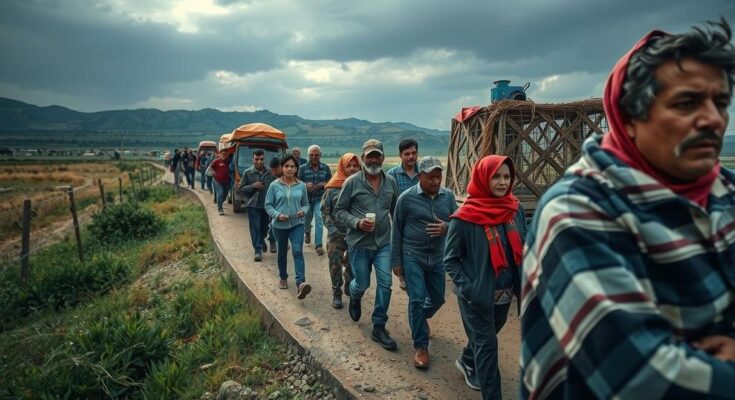Lebanese families displaced in Iraq are returning home to southern Lebanon following a ceasefire between Israel and Hezbollah. The ongoing humanitarian crisis sees over 20,000 refugees seeking to rebuild their lives, although many express concerns over the conditions of their homes. Governmental support in Iraq has facilitated this process, yet uncertainty looms regarding the sustainability of their return.
Following the recently established ceasefire between Israel and Hezbollah, Lebanese families who were displaced in Iraq are now beginning their return to southern Lebanon. This cessation of hostilities has provided an opportunity for many to journey home, despite the devastation waiting for them. Ali Abdulla expressed his resolve to return, stating, “After two months, we are returning to our homeland. We will return even if we find our homes destroyed; we will sit on the ground.”
Official estimates indicate that over 20,000 Lebanese sought refuge in Iraq since the outbreak of the conflict, and now, with approximately 800 individuals departing to Beirut weekly, hopes for recovery are rising. Yousef Barakat expressed optimism, affirming, “Returning home was faster than we expected. A ceasefire has been achieved. We, the southerners, have not and will not abandon our land.”
Iraqi authorities and Shi’ite organizations have facilitated the return process, offering essential services such as accommodation and healthcare to ensure safe transit for the displaced families. However, the conditions in Lebanon remain challenging, as many Lebanese hesitate to return due to the uninhabitable state of their homes caused by the ongoing conflict.
Rabea Ali, a mother from southern Lebanon, articulated her concerns regarding the future, saying, “I no longer have a home; everything is destroyed. If we return, where will we sleep, on the street? What is the future of our children if they stay in Lebanon? No education, no future, and no home.” Her son Omar supports her decision to remain in Iraq, seeking better prospects. Meanwhile, Rabea’s youngest son, Ali Hassan, expresses a longing for his homeland, wishing to honor a friend lost to the conflict, demonstrating the complex emotions surrounding homecoming amidst devastation.
The article discusses the recent return of Lebanese refugees from Iraq to southern Lebanon following a ceasefire between Israel and Hezbollah. Triggered by the conflict that escalated after the Gaza war, many families sought refuge in Iraq. The ceasefire, facilitated by international diplomacy, has provided some hope for returnees, but concerns regarding infrastructure and safety persist. The backdrop is one of destruction, loss, and the uncertain future facing those returning to their homeland after significant trauma and displacement.
In conclusion, while the ceasefire allows some Lebanese families to return to their war-torn homes, many still face insurmountable challenges such as the destruction of infrastructure and uncertain living conditions. The emotional landscape for these individuals is marked by a desire to return home, mixed with fear and concern for their families’ futures. The ongoing situation emphasizes the complexity of displacement and the challenge of rebuilding lives after conflict.
Original Source: indianexpress.com




